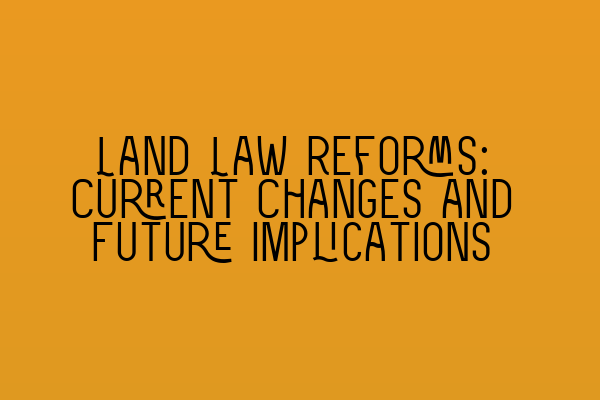Land Law Reforms: Current Changes and Future Implications
Introduction:
Land law reforms have been an ongoing topic of discussion in recent years. As the legal landscape continues to evolve, it is crucial for solicitors and legal professionals to stay updated on the latest reforms and understand their implications. In this blog post, we will explore the current changes in land law and discuss their potential future implications.
1. Land Registration Process:
One of the key areas of land law that has witnessed significant changes is the land registration process. The introduction of the Land Registration Act 2002 has revolutionized how land is recorded and transferred. Under this act, there is now a centralized register where all land is registered, making it easier to track ownership, interests, and charges. This change has brought about greater transparency and efficiency in the property market.
To gain a better understanding of the land registration process and its implications, you may want to check out our related article on SQE 1 Practice Exam Questions.
2. Leasehold Reforms:
Another important aspect of land law reforms revolves around leasehold properties. Leasehold reforms aim to address the issues surrounding leasehold ownership, such as onerous ground rents, unfair leasehold practices, and limited control for leaseholders. The government has proposed several reforms to provide leaseholders with greater protections and rights, including the ban on new leasehold houses and reducing ground rents on new leases to zero.
To delve deeper into the complexities of leasehold reforms, we recommend reading our article on SQE 1 Practice Mocks FLK1 FLK2.
3. Changes in Easements and Covenants:
Easements and covenants are crucial legal concepts in land law that govern the rights and obligations of landowners. Recent reforms have focused on clarifying and modernizing these areas of law. The Supreme Court’s decision in the case of Coventry v. Lawrence has provided much-needed guidance on the law of easements, particularly in relation to prescription and the scope of rights acquired over time.
If you are interested in learning more about easements and covenants, our SQE 2 Preparation Courses offer comprehensive resources to help you navigate this complex area of land law.
4. Digitalization and Technology:
In today’s digital age, technology has had a profound impact on the legal profession, including land law. The introduction of electronic signatures and online land registration systems has streamlined processes and made transactions more efficient. However, the use of technology in land law also raises concerns around data security and privacy. As technology continues to advance, it is essential for solicitors to stay abreast of digitalization trends and their potential implications in property law.
For more information on how technology is shaping land law, feel free to explore our SQE 1 Preparation Courses.
5. Future Implications:
The current land law reforms have far-reaching future implications for solicitors and legal professionals. As the legal landscape continues to evolve, keeping up with these changes will be vital to providing effective legal advice and representation to clients. It is anticipated that there will be further reforms and developments in areas such as adverse possession, land rights, and environmental considerations.
To stay updated on future land law reforms and their potential implications, refer to the SRA SQE Exam Dates, as they will likely announce any changes or updates to land law syllabus.
Conclusion:
Land law reforms have significantly transformed the legal landscape, bringing about greater transparency, fairness, and efficiency. Understanding the current changes and future implications is crucial for solicitors and legal professionals to provide the best possible services to their clients. By staying informed and continually updating their knowledge, solicitors can navigate the complexities of land law and adapt to the ever-changing legal landscape.
Disclaimer: The information provided in this blog post is for educational purposes only and should not be considered as legal advice.
